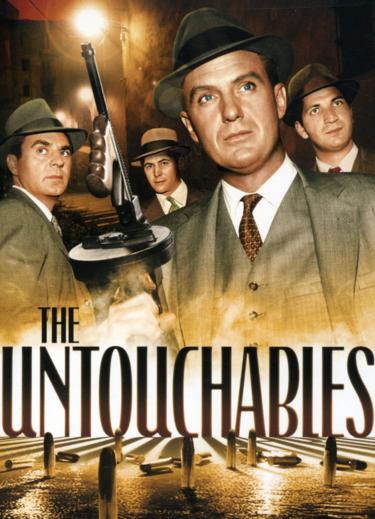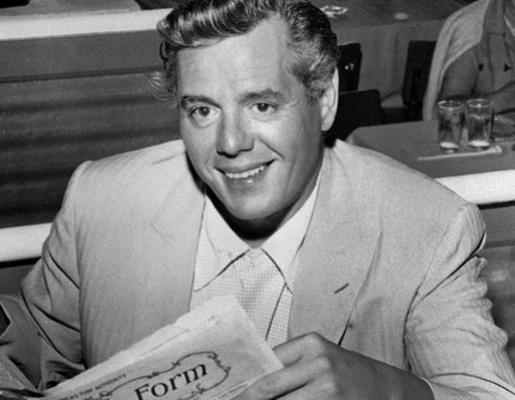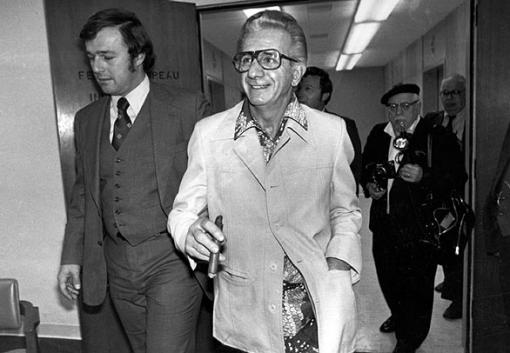Did the Mafia Really Order a Hit on Desi Arnaz For His Role as the Producer of The Untouchables?
Here is the latest in a series of examinations into urban legends about TV and whether they are true or false. Click here to view an archive of the TV urban legends featured so far.
TV URBAN LEGEND: Did the Mafia really order a hit on Desi Arnaz for his role as the producer of The Untouchables?
As the discussion about violence in television and films continues to take a front seat in the media (particularly after the tragic events in 2012 in Aurora, Colorado and Sandy Hook, Connecticut), it is interesting to see just how long the battle over television violence has been going on. Over fifty years ago, there were Congressional hearings addressing television violence! In 1961, the third congressional hearing took place discussing the effects of television violence upon juveniles took place. It lasted nearly a year from June 1961 to May 1962. Once it finished, Congress released no reports and made no findings. However, the two series that were generally the two most discussed during the hearings were the short-lived anthology series Bus Stop (some folks even refer to the 1961 hearings as the “Bus Stop hearings”) and the hit weekly series about Elliot Ness and his elite group of federal agents taking on the mob, The Untouchables.
Bus Stop was mostly in trouble for its usage of teen idol Fabian as a serial killer in one episode. The Untouchables, on the other hand, was roundly criticized in general for its use of violence on a regular basis. Anti-violence advocates were not the only people angry at The Untouchables, though. Decades before The Sopranos found themselves on the bad side of the Italian Anti-Defamation League, The Untouchables was attacked by many who felt that the show treated Italians and Italian-Americans as cartoonish villains. Unsurprisingly, among those angry at the show and its producer, Desi Arnaz (of I Love Lucy fame), was the Mafia. However, did their anger go so far as to order that Arnaz be murdered?
Read on to find out!
In 1958, Desilu Productions (the production company owned by Arnaz and his soon-to-be-ex-wife and former I Love Lucy co-star, Lucille Ball) began work on a two-hour TV movie about Elliot Ness (played by Robert Stack) taking on the Chicago gangster Al Capone (played by Neville Brand). The movie aired in January 1959 and was such a big success that it launched a regular television series on ABC in October of the same year. Rather than spotlighting the fact that Ness’ men worked for the Treasury department, the show instead tended to be vague about WHICH federal agency Ness and his men worked for, leading many to presume that Ness and his men were FBI agents. When the show began, Arnaz actually contacted the FBI for permission to refer to the FBI and use FBI cases in The Untouchables (they said no, but Arnaz ended up using FBI cases anyways, irritating the FBI and leading to a number of complaints by J. Edgar Hoover and the FBI to ABC). Each episode was introduced by Walter Winchell, giving the show a sense of authenticity that Arnaz felt would work as a shield to the inevitable complaints about the violence and lurid plots of the series. After all, all Arnaz was doing was telling real life stories! Star Robert Stack, who won an Emmy for Best Actor for the show’s first season, notably scoffed at the critics – “How dare they tell us how to run our business? How would they have us tell the story of this violent era?” Well, as it turned out, plenty of people had views on how the show should be run and as the show became a major hit in its second season (it was the eighth most watched TV program in the country for the 1960-61 season) it gained more and more criticism from people as varied as United States Congressman Alfred E. Santangelo (from New York), the Italian Anti-Defamation League and, of course, Frank Sinatra. Sinatra had a production company on the Desilu lot and he angrily moved his company off of their lot. Sinatra and Arnaz argued so much over the show that some witnesses to their arguments suggested that the two men were close to exchanging blows (Arnaz apparently exacerbated thing by making a reference to Sinatra’s much publicized lack of success in the world of television. Arnaz eventually smoothed things over with Sinatra by making him a very public $1 million offer to produce any movie of his choosing at Desilu, noting to the media, “That’s what I think of Frank’s talent and ability to draw at the bos office”). Protests from the International Longshoremen’s Association seemingly led to the show’s sponsor, Liggett & Myers Tobacco Company (specifically their Chesterfield King cigarettes) to pull out of sponsoring the show (rumors circulated that the Mafia threatened L&M that their cigarettes would suddenly not be delivered at the docks if they continued to sponsor the show – I can’t speak to the authenticity of the rumors, although I think it is fair to say that if the Longshoreman’s Union is against you, you likely at least believe that the mob is against you, as well).
Finally, Arnaz answered his critics by agreeing to three major points:
1. The show would no longer feature fictional Italian villains (as you might imagine, the show quickly ran out of ACTUAL bad guys and eventually switched to fictional villains)
2. The show would spotlight Enrico Rossi, a fictional Italian-American member of Ness’ crew
and
3. The show would spotlight the efforts by “good” Italian-Americans, both specifically their anti-crime positions but also their general contributions to society
Sadly for The Untouchables, though, in their third season they faced a foe that they could not stop, Sing Along With Mitch. Yep, NBC launched a TV series starring the famed bandleader Mitch Miller and it was a hit, making the Top 20 in the 1961-62 season while The Untouchables fell from eighth to forty-FIRST. ABC tried moving the show in season four to take on a pair of older popular shows, The Dick Powell Show and The Jack Benny Program, but The Untouchables got killed by them, as well, and it ended after its fourth season (it was quite popular in off-network syndication throughout the 1960s, however).
So by 1963, The Untouchables was gone from network television. However, back at its peak, did the Mafia’s ire with Arnaz really lead them to order Arnaz killed?
The Mafia bosses most angered by the show were, quite naturally, the ones in Chicago. Arnaz was actually friends with Al Capone’s son, Sonny, during high school, but he knew that that earlier friendship was going out the window as soon as the news came that Arnaz was planning on doing something involving Capone (Arnaz recalled Sonny asking him, “Why you? Why did you have to do it?” The younger Capone failed to be convinced by Arnaz’s “If I don’t do it, somebody else will” retort). When the series began, Capone’s widow Mae sued the show for using Al Capone’s name without their permission. They lost, but Capone tended not to show up on The Untouchables anyways. The main bad guy was Capone’s successor, Frank Nitti (played by Bruce Gordon), who, of course, was never a “target” of Ness and The Untouchables (Ness and his men shut their operation down as soon as they “got” Capone).
Now we get to the meat of the story. Did the Mafia order Arnaz killed?
According to former Mafia member Jimmy “the Weasel” Fratianno, yes.
Fratianno was a longtime member of the Mafia (both in Los Angeles and in Chicago) who turned on his fellow gangsters in the late 1970s when he felt that they had turned on him and had marked him for death, so he became a government witness. By 1984, Fratianno was a witness in ten different criminal prosecution cases. Seven of the ten cases ended in convictions with seventeen of twenty-five defendants being convicted. In 1981, The Last Mafioso: The Treacherous World of Jimmy Fratianno was released, written by crime writer Ovid Demaris, based on interviews with Fratianno after he turned government witness in 1978. In it, Fratianno recalled a conversation he had with Chicago mobster John Roselli:
Roselli: Have you seen that TV show, The Untouchables?
Fratianno: A couple of times, but I don’t have time to watch that shit.
Roselli: Let me tell you something, Jimmy. Millions of people all over the world see this show every fucking week. It’s even popular in Italy. And what they see is a bunch of Italian lunatics running around with machine guns, talking out of the corner of their mouths, slopping up spaghetti like a bunch of fucking pigs. They make Capone and Nitti looks like bloodthirsty maniacs. The guys that write that shit don’t know the first thing about the way things were in those days. Eliot Ness, my ass. The tax boys got Al, not Ness. And what did he ever have to do with Frank Nitti?
Fratianno: Nobody pay attention to that shit. It’s like a comic book, a joke. Who cares?
Roselli: I’ll you, Jimmy. Sam cares. Joe Batters cares, Paul Ricca cares, and I care. Jimmy, what I’m about to tell you has been decided by our family. The top guys have voted a hit. I’ve already talked to Bomp about it. We’re going to clip Desi Arnaz, the producer of the show.”
The “Sam” in the above piece would be Sam Giancana, head of the Chicago mob. The other guys are similarly high-ranking Chicago guys. “Bomp” was a San Diego based mob hitman named Frank Bompensiero. Fratianno continues to note that Bompensiero was unenthusiastic about the assignment, thinking it to be a bad idea and he and his men dragged their feet for a couple of weeks before Giancana changed his mind. Fratianno suggests that Mae Capone squelched the hit when she found out about it. In addition, the aforementioned $1 million offer to Sinatra, according to Fratianno “concluded the contract. Desi Arnaz never knew how close he came to getting clipped.”
Here’s the thing, though. While Fratianno made for a good government witness, he also tended to exaggerate things. This wasn’t a major problem in the government cases, where they mostly just needed him to testify to corroborate the evidence that they already had, but it is not like the government was going after people just on Fratianno’s say-so. Meanwhile, Fratianno was also a well-known attention whore. In fact, after he did a SECOND biography with Michael Zuckerman in 1987 called Vengeance Is Mine: Jimmy the Weasel Fratianno Tells How He Brought the Kiss of Death to the Mafia, the government actually kicked Fratianno out of the Witness Protection Program, arguing that he could take care of himself. He was making himself too public of a figure, giving out countless interviews, including a few notable interviews on 60 Minutes. In addition, Ovid Demaris, the writer of the book with the tale of the Arnaz murder plot, seemed to stretch the truth on a few occasions, as well, getting some deaths in the book wrong and mostly seeming to go along with the adage, “When the legend becomes fact, print the legend.” Zuckerman’s book is a good deal more detailed and Zuckerman does not mention the Arnaz hit except a passing mention. One of the juiciest Fratianno stories and he leaves it out of the book? Sure sounds like a case of a Fratianno stretching the truth a bit too far.
However, most damning to me is that in 1982, Fratianno testified in a whole other kind of trial. Penthouse magazine was sued by the Carlsbad, California resort Rancho La Costa Resort and Spa for libel over an article in the magazine suggesting that mob figures would conduct business at the resort. Fratianno testified that he conducted mob business at the hotel. However, just one year after the book came out telling the story about how the Arnaz hit went down in 1961, with Roselli telling him the wishes of the Chicago mob, Fratianno was testifying in court that Sam Giancana himself ordered the hit at Rancho La Costa Resort and Spa in 1966 (the resort had just opened the previous year, so it wasn’t like Fratianno just forgot the date). The La Costa lawyers objected to Fratianno’s over-sharing (the question was a simple “Was there criminal activity at the meeting?”) and his response was stricken from the record (the “passing reference” I mentioned earlier with regards to Zuckerman’s book is him noting that Fratianno mentioned the Arnaz killing in the Penthouse libel suit, with Zuckerman making a point to note that the judge struck the mention from the record).
That’s not just a slight difference between the two versions, that’s a huge difference. In addition, the later version involves Sam Giancana ordering the murder of a guy for making a TV series that had been off the air for three years at the time. In addition, it is worth noting that Arnaz actually sold his share of Desilu to Ball in 1962, so he didn’t even own the company behind The Untouchables in 1966. So it seems highly unlikely that Fratianno’s later version is accurate.
When you combine Fratianno’s tendencies to exaggerate with Demaris’ tendencies to exaggerate and then combine that with the two drastically different stories and then combine that with the fact that no one else has ever suggested that the mob actually put out a hit on Arnaz (plenty of sources have said that the mob wanted to, but not that they ever actually did) and combine that with the much more detailed second Fratianno biography by Zuckerman that does not bring up the Arnaz hit and I think it is enough to lean towards the story being false.
I could easily believe someone like Giancana would have wanted to kill Arnaz, but the idea of a mob boss actually ordering the assassination of a major Hollywood star over a TV show? It is so far-fetched that I would need something better than a known exaggerator who told two wildly divergent versions of the story (one of which was under oath and was especially unbelievable) to make me believe it was actually true.
So, I’m going with the legend as…
STATUS: False
Thanks to Coyne S. Sanders and Tom Gilbert’s book, Desilu : The story of Lucille Ball and Desi Arnaz, Michael Zuckerman’s Vengeance Is Mine: Jimmy the Weasel Fratianno Tells How He Brought the Kiss of Death to the Mafia, Ovid Demaris’ The Last Mafioso: The Treacherous World of Jimmy Fratianno and the reporting of Laurinda Keys of the Associated Press for the information.
Feel free (heck, I implore you!) to write in with your suggestions for future installments! My e-mail address is bcronin@legendsrevealed.com.








